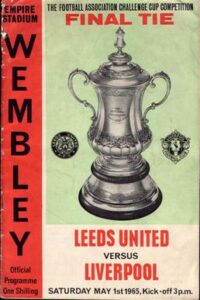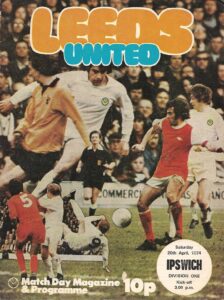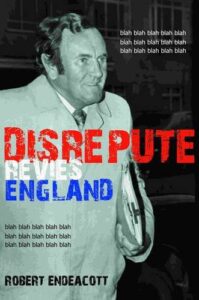Book Review – Cocker Hoop: The Biography of Les Cocker, Key Man for Ramsey and Revie by Robert Endeacott & Dave Cocker

The great Leeds United side of the late sixties and seventies and the England World Cup winning team of 1966 are remembered for the men that managed them, Don Revie and Sir Alf Ramsey respectively. But there is an individual that connects both, and whose name is not so familiar – that of Les Cocker. And whilst there are various books about Revie and Ramsey detailing their respective playing and managerial careers, the story of the assistant to both these giants of the English game is pretty much unknown.
That wrong has been righted with the publication of, Cocker Hoop: The Biography of Les Cocker, Key Man for Ramsey and Revie by Robert Endeacott & Dave Cocker. Endeacott is a well-known writer of a number of books, many about his beloved Leeds United, and co-authors this book with Les Cocker’s son Dave. Given then that one of the co-authors as a die-hard Leeds fans could be seen to be wearing white rose tinted glasses and the other co-author is the book subject’s son, some may question how dispassionate a book this can be.
Following a generous Foreword from ex-Leeds United player John Giles (as he signs himself in the book, rather than the Johnny familiar in his playing days) about his time working at the Elland Road club with Les Cocker, there follows an Introduction from Endeacott. Here, his distain for the film The Damned United is detailed given its portrayal of people and events, including Cocker. Now as a non-Leeds United fan and given my view that the film is deeply fictionalised for cinematic effect, I don’t have the same misgivings or deep rooted anger towards the film as many of the Elland Road faithful have. However, with Endeacott having expressed this, from this point on for me as a reader, there was a nagging feeling that the book felt like it had to come up with a justification to dispel the ‘fictional’ Cocker figure.
So who was the ‘real’ Les Cocker?
Readers are told his story in a traditional timeline, with the opening chapters looking at his childhood and family as the young Cocker grew up in Stockport, following his birth there in March 1924. At the outbreak of the Second World War, Cocker was too young to join up, but in 1941 was called up for National Service. In 1944 D-day 06 June, Les suffered a head wound which saw his returned to England to recover. Like many men of the time, we discover that he didn’t like to talk about his wartime experiences and in understated fashion referred to his injury as, “just a graze” indicative of a stoic nature.
With the war over, we discover that Cocker had a professional playing career, beginning in 1945 and finishing in 1958 as a forward with local side Stockport County and then Accrington Stanley. Probably the most significant part of his transfer and which was to ultimately create his future career was the agreement that Accrington would pay for his FA coaching courses and Treatment of Injuries course.
What is engaging and works to provide real insight into Cocker are the interviews that Endeacott provides within the book. One such and relating to Cocker’s time at Accrington as a player, is with the ex-Lancashire and England player and until recently Sky Cricket Commentator, David ‘Bumble’ Lloyd. Accrington born Lloyd speaks with affection about Cocker the player, “he was a marauding centre-forward, I mean fearless, all action, all effort…yeah, he was a dirty bugger but a really nice bloke.” This interview forms part of Chapter 2, taking Cocker’s story up to the point of him accepting his first coaching role at Luton Town in 1959.
Chapter 3 sees him make the move to Leeds United in July 1960 who along with Cocker’s previous employer, Luton Town had been relegated from the First Division at the end of the 1959/60 campaign. In another of Endeacott’s insightful interviews, former Leeds player Gerry Francis, provides an early assessment of Cocker’s impact at Elland Road. “Les was a very good coach and trainer…he was also very strict. If you did not train as hard as he thought you could, Les would be tough on you.” Leeds though struggled in the 1960/61 season and in March 1961, Don Revie took up the reins at the club as Player/Manager, keeping the Elland Road club out of the ignominy of relegation to the then Third Division.
Meanwhile Les was starting on a path to connection with the England national team set-up, becoming trainer to the Under 23 side in November 1961. The remainder of the chapter takes readers through to the 1963/64 season, when Leeds won the Second Division title to return to the top-flight of English football, with John Giles highlighting that Cocker’s skills didn’t simply extend to coaching, with Les also taking “care of the medical side of things for the players too, in the afternoons. Les was a huge contributor to the success of the club.”

Chapter 4 sees Leeds start to make their make on the English game with a first appearance in the 1964/65 FA Cup Final, although ultimately losing 2-1 to Liverpool. There is also a telling story offering another view to the alternative as Cocker as just a tough trainer. In a Under 23 friendly in Vienna, Alan Ball was sent off with Les providing a consoling arm to the distraught player. England senior manager Sir Alf Ramsey noted this as “it showed that he (Cocker) would influence, for the better, the player’s future conduct” and was no doubt part of Ramsey’s decision to promote Cocker to trainer of the senior England squad and therefore a key part of the 1966 World Cup preparations.
The lead up and the tournament in 1966 dominate Chapter 5, with an excellent interview with the Three Lions right-back of the time, George Cohen, providing a great inside view of the England set-up and Cocker’s contribution during that historic time. Once again readers get to see another part of Cocker’s range of skills, with Cohen stating, “he (Cocker) knew what an individual needed, he was very good that way, spotting areas that a player might need to work on.”
Chapter 6 1967 to 1970 – Leeds’ time and turn for glory?, centres on the Elland Road club finally bringing major silverware to LS11, with the League Cup, First Division title and Inter Cities Fairs Cup adorning the trophy cabinet. It highlights Cocker’s contribution to success and how he understood the support that injured players needed in their rehabilitation during a period when Leeds were playing for a number of trophies at home and in Europe. The chapter also looks at England’s preparation for the 1970 World Cup in Mexico and the unsuccessful defence of the Jules Rimet trophy.
Chapters 7 & 8 look at the period up to 1973, with Leeds picking up more silverware in the shape of the 1971/72 FA Cup but missing out on the First Division title as runners-up in 1970/71 and 1971/72. Cocker again continues as the no-nonsense and loyal assistant as part of Revie’s backroom staff. However, for the England national side dark clouds gather as they miss out on qualification for the 1974 World Cup finals in West Germany.

1974 and past it? focuses on the period of change both from an England perspective and that at Elland Road. April 1974 saw Sir Alf Ramsey sacked, prompting all the backroom staff including Cocker stating they would resign in a show of loyalty to the ex-England boss. However, Ramsey whilst appreciating the gesture, talked them all out of the course of action. Indeed throughout the book, the FA is not seen in a good light, with the institution in one incident more concerned with looking after the FA Council members than those on the frontline. Leeds went onto win the 1973/74 First Division championship and with it, put Don Revie in a position as favourite to take the England job. Interestingly, the book details how Cocker “urged him (Revie) not take it as it was the worst international squad Les had known in his career; there were too many ‘ordinary’ players around.” Despite Revie’s recommendation of John Giles as the new manager, the board went with Brian Clough, and in doing so, Cocker left to take up a role as Assistant England Manager.
Chapter 10 looks at the three years for Les in the England senior camp. It shows how the world of club and international football differ with the lack of regular contact that was enjoyed at Leeds not able to be replicated for England, and as Endeacott reflects, “recreating such wonderful alchemy was a romantic but implausible idea at international level.” With Revie unable to work his magic for the Three Lions and the FA it seems working behind the scenes to bring in another manager, he resigned in in 1977 taking up a role as the manager of the United Arab Emirates national team. Cocker the ever-loyal assistant joined his ‘gaffer’ in Dubai.
The final chapter, The UAE and then ‘Donny’, sees Cocker complete the two-years of his contract in the Middle East, leaving Revie to stay on and later manager Emirati clubs, Al-Nasr and Al-Ahly. Cocker returned to England as assistant to Billy Bremner at Fourth Division Doncaster Rovers, “working there voluntarily, being paid only for his travel expenses.” There is another well conducted interview from Endeacott, with Glynn Snodin who was at Rovers at the time (and later went on to play for Leeds), explaining that Cocker’s enthusiasm and input was the same whatever the level of the game, “if you needed help, Les was always there for you. He’d tell you things but ask you things as well, he wanted your opinion, he wasn’t just about ordering you about.” Tragically, Les was to die suddenly of a heart attack, only 55 years old, on 04 October 1979, a shocking loss to his family and the world of football.
Co-authors Robert Endeacott and Dave Cocker have provided a wonderful tribute to Les Cocker in this book, with Endeacott’s insightful interviews and knowledge of Leeds United combining with Cocker’s family anecdotes and stories of the time. It shows Les Cocker as a talented individual, whether as a coach, assistant manager or trainer, loyal, hardworking, wanting nothing more than to make players and the team the best they could be. A great read for the Elland Road faithful, but also for anyone wanting to get a view of football from the 1960s and 1970s.
(Publisher: Pitch Publishing Ltd. July 2022. Hardcover: 256 pages)
Buy the book here:Les Cocker
 The true story of Don Revie’s three years as England manager, 1974 – 1977; the follow-up to Dirty Leeds.
The true story of Don Revie’s three years as England manager, 1974 – 1977; the follow-up to Dirty Leeds. Players such as Gary Sprake, Paul Reaney, Terry Cooper, Billy Bremner, Jack Charlton, Norman Hunter, Peter Lorimer, Allan Clarke, Mick Jones, John Giles, Eddie Gray, Paul Madeley, Bobby Collins, John Charles, Willie Bell, Albert Johanneson and Mick Bates – all managed by Don Revie. The famous Leeds United AFC – the team they love to hate, run by the man they love to hate. Thirteen years, thirteen chapters. Thirteen, unlucky for some…
Players such as Gary Sprake, Paul Reaney, Terry Cooper, Billy Bremner, Jack Charlton, Norman Hunter, Peter Lorimer, Allan Clarke, Mick Jones, John Giles, Eddie Gray, Paul Madeley, Bobby Collins, John Charles, Willie Bell, Albert Johanneson and Mick Bates – all managed by Don Revie. The famous Leeds United AFC – the team they love to hate, run by the man they love to hate. Thirteen years, thirteen chapters. Thirteen, unlucky for some…